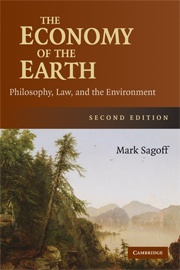Book contents
- Frontmatter
- Contents
- Acknowledgments
- 1 Introduction
- 2 At the Shrine of Our Lady of Fatima or Why Political Questions Are Not All Economic
- 3 The Allocation and Distribution of Resources
- 4 Values and Preferences
- 5 Can We Put a Price on Nature's Services?
- 6 Do We Consume Too Much?
- 7 Is an Environmental Ethic Compatible with Biological Science?
- 8 Settling America or the Concept of Place in Environmental Ethics
- 9 Natural and National History
- 10 Environmentalism: Death and Resurrection
- Notes
- Index
6 - Do We Consume Too Much?
Published online by Cambridge University Press: 05 June 2012
- Frontmatter
- Contents
- Acknowledgments
- 1 Introduction
- 2 At the Shrine of Our Lady of Fatima or Why Political Questions Are Not All Economic
- 3 The Allocation and Distribution of Resources
- 4 Values and Preferences
- 5 Can We Put a Price on Nature's Services?
- 6 Do We Consume Too Much?
- 7 Is an Environmental Ethic Compatible with Biological Science?
- 8 Settling America or the Concept of Place in Environmental Ethics
- 9 Natural and National History
- 10 Environmentalism: Death and Resurrection
- Notes
- Index
Summary
A cartoon by Roz Chast in the New Yorker depicts two monk-like figures on a street, each carrying a sign. One sign reads: “The End of the World Is at Hand for Religious Reasons.” The sign carried by the other declares, “The End of the World Is at Hand for Ecological Reasons.” In a recent issue of Conservation Biology, David Orr observed “an interesting convergence of views between conservation biologists and religious fundamentalists” because “both agree that things are going to hell in the proverbial handbasket.” Yet conservationists and religious fundamentalists (to use Orr's appellation) do not agree entirely. It is only the conservation biologists, at least those Orr identifies, who believe that the end is near. They describe today's booming global economy as Armegeddon – as a “hike through the Book of Revelation.”
Many environmentalists believe that the world has entered the “Last Days” or that the Apocalypse looms because they subscribe to the Malthusian theory that as population and consumption increase, resources inevitably diminish and become exhausted. Conservation biologists declare that “whether by climate change, biotic impoverishment, catastrophic pollution, resource wars, emergent diseases, or a combination of several, the end is in sight, although we can quibble about the details and the schedule.”
- Type
- Chapter
- Information
- The Economy of the EarthPhilosophy, Law, and the Environment, pp. 110 - 136Publisher: Cambridge University PressPrint publication year: 2007



